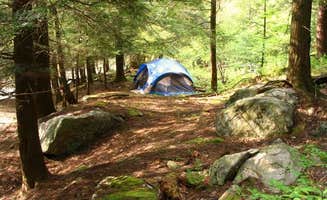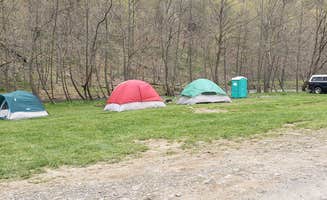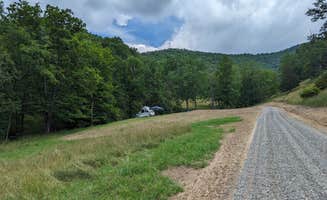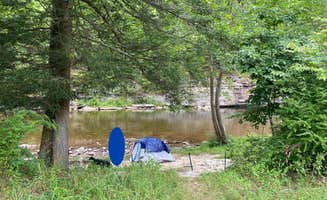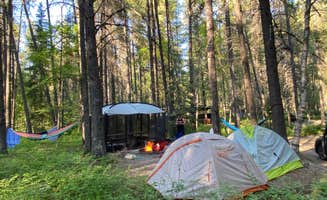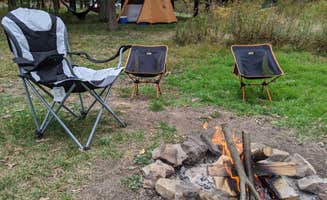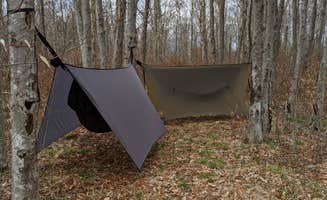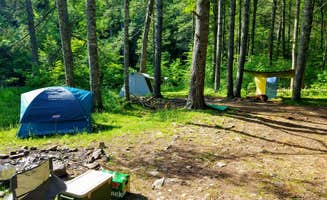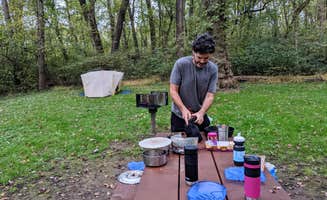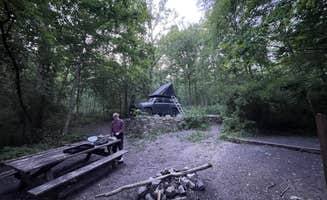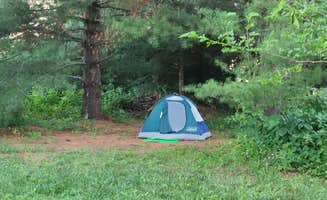Tent camping near Maysville, West Virginia offers primitive sites at elevations ranging from 1,200 to 3,000 feet within the Monongahela National Forest region. The area experiences temperature variations with summer highs around 80°F and evening temperatures that can drop into the 40s even in summer months. Most campgrounds in this region require campers to bring their own water, as natural springs and streams are the primary water sources.
What to do
Rock climbing opportunities: At Eagle Rock Campground, the namesake rock formations provide challenging climbs. "Eagle Rocks, named after a Revolutionary War soldier buried in the area tower over the river. I don't climb, but I did see a note indicating that it's a 5.11 rating," notes Jean C.
Fishing access: Several riverside camps provide excellent fishing access. "The South Branch of the Potomac forms the other border of the campground and its not uncommon to see fisherman in the river. The river is stocked with trout and there are some areas with catch and release instructions," reports a camper at Eagle Rock Campground.
Exploring boulder formations: Take time to explore the unique geological features at Bear Heaven Campground. "Right beside the camp ground is a really cool area to explore unique boulders and rock structures. You can either walk through or climb these boulders," explains Adam W.
Kayaking options: Bring your kayak to enjoy the water at multiple locations. "It is close to the Savage River reservoir, which is great for kayaking," shares Mark K. about Big Run State Park, while Switzer Lake offers electric motor and paddle boat access.
What campers like
Privacy between sites: Many campers appreciate the space between tent sites. At Big Run State Park Campground, "there was a lot of space between each site and it was very peaceful," notes Aakansha J. Another camper adds, "Tons of space between sites."
Creek sounds: Falling asleep to the sound of flowing water is a highlight for many. "Beautiful campsite and loved the sound of the river as white noise!" shares Zoe H. about Big Run State Park, while Katie H. notes you can "set up your camp chair and enjoy the creek sounds."
Dark skies for stargazing: The remote location provides exceptional night sky viewing away from light pollution. "It's quiet and dark," reports one camper at Wolf Gap Recreation Area, making it ideal for stargazing.
Wildlife encounters: The area supports diverse wildlife. A local camper at Lost Land Run warns to "Keep an eye out for lots of the more dangerous varieties of wildlife native to the area big cats, snakes galore, bear, coyotes etc but beautiful views if you're ready for an adventure."
What you should know
Limited facilities: Most campgrounds offer minimal amenities. "True boondocking, haul it in, pack it out. Evidence of a cat hole in the site we picked," explains Kevin C. about Squirrel Hollow Road Camping.
Cell service limitations: Expect very limited connectivity. "Due to location in-between the tall mountains there is absolutely No CELLPHONE SERVICE past the first couple campsites and only very spotty at those campsites as well," warns Natasha S. about Lost Land Run.
Water availability: Drinking water is scarce at most sites. "The pit toilets were a nice long walk or a short drive away and not the worst I've seen," shares a camper at Big Run, while another notes, "Water and dump station is 10 minutes up the road at New Germany State Park."
Road conditions: Access to some camping areas requires careful driving. At Switzer Lake, "the road is a mix of gravel but also dirt so it can become muddy during rain," according to Emil D., who adds, "If you follow the road, there is a river crossing that will take you to additional camp spots."
Tips for camping with families
Stream exploration for kids: Children can enjoy shallow water play at several campgrounds. "The kids loved playing in the water. Very quiet and relaxing!" shares Andy C. about their experience at Big Run State Park with a family.
Avoiding challenging trails: Some trails aren't suitable for younger children. At Lost Land Run, a local warns it's "not recommended for beginners or small children as it is very Rocky, slippery, with too much potential for a serious injury with inexperienced people."
Wildlife education opportunities: Use wildlife sightings as teaching moments but take precautions. "There are bears here, so lock up your food in the car. We have encountered a bear at or around the campsite 3 times," shares Emil D. about camping at Switzer Lake.
Weekday camping advantages: For families seeking quiet experiences, weekdays offer less crowded conditions. "Sites were quiet at night. Some traffic related to logging activity. Looks like a popular weekend camp spot for locals. We camped during the week and had nobody else camping on weekdays," notes Kevin C.
Tips from RVers
Site leveling challenges: RV campers should scout sites before setting up. "Most of the car parking pads are not level. But the tent pads appear to be," advises a VanRumschpringa about Wolf Gap Recreation Area.
Small trailer access: While many sites can't accommodate large RVs, small trailers can access certain areas. "Sites are located less than a mile from the paved highway. We found 5 spots just off the road. All were easily accessible by car or with a small teardrop trailer," reports Kevin C. about Squirrel Hollow Road.
Cabin alternatives: When weather turns unfavorable, consider cabin options. "Tented a cabin for two nights to hide from bad weather. Cabin had electric service, a microwave, electric heater, refrigerator and lights," shares Kevin C. about Abrams Creek Campground and Retreat Center.


